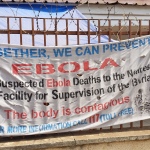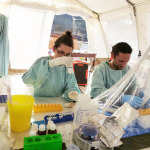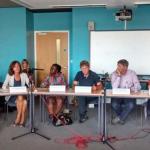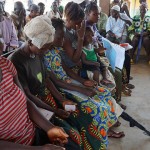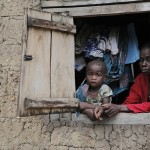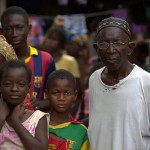A team of researchers from the London School of Hygiene & Tropical Medicine and Innovations for Poverty Action Sierra Leone developed a study evaluating the use of mobile technology in improving the process of tracing contacts of Ebola patients in Sierra Leone. As part of this study, the team, with the help of a developer, designed a customized application using Dimagi’s CommCare that has been implemented in the district of Port Loko. The research team seeks an individual or small group of mHealth experts to
Continue reading →
This issue of Limn on “Ebola’s Ecologies” examines how the 2014 Ebola outbreak has put the norms, practices, and institutional logics of global health into question, and examines the new assemblages that are being forged in its wake. The contributions focus on various domains of thought and practice that have been implicated in the current outbreak, posing questions such as: What has been learned about the ambitions and the limits of humanitarian medical response? What insights are emerging concerning the contemporary organization of global health
Continue reading →
This advisory brief aims to provide anthropologically informed guidance to governmental and humanitarian actors involved in the Ebola response at local, national and international levels, about clinical trials for Ebola treatments, therapies and vaccines. It serves to (1) clarify and demystify some of the scientific and technical discussions around the numerous clinical trials; (2) revisit issues surrounding the compassionate use of experimental medications and therapies in and after an emergency; and (3) provide a summary of the cultural, institutional and historical factors that impact the
Continue reading →
The Working Group on Clinial Trials coordinated by the Ebola Response Anthropology Platform has produced a working document which considers the clinical trials that are planned as part of the Ebola outbreak response from a sociological and anthropological perspective. The document develops a series of critical and empirical questions to guide research that should be conducted within, alongside or separate from clinical interventions. The document goes on to consider questions specific to vaccine, therapeutic and convalescent blood and plasma trials.
Survivors are rapidly becoming a strategic population for the Ebola Outbreak response. The public health potential of this group appear to be manifold—from safe burials and the care for orphan children to community outreach and the donation of blood for clinical trials. There are a number of stories emerging from the field of survivors who refuse to leave Ebola Treatment Units, offering their support in caring for new patients. Data regarding the status and experience of survivors is somewhat thin, although anthropological experience of the
Continue reading →
The first round of trials on novel therapeutics for Ebola are set to begin imminently. Members of the Ebola Response Anthropology Platform, Ann Kelly and Clare Chandler, represented the Platform by participating in the WHO Ethics Working Group meetings in September and October 2014 to discuss ethical considerations for trials of new vaccines and therapeutics for Ebola viral disease. At a previous WHO consultation in August 2014, the Panel concluded unanimously that it would be acceptable on both ethical and evidential grounds to use as potential treatments or for
Continue reading →
Held as part of the African Studies Association conference 2014, Ebola: The Challenges united an esteemed panel of speakers to discuss ways in which academia can mobilise to support those effected by the ebola outbreak.
Case Studies on Contemporary Social Issues book by Barry Hewlett and Bonnie Hewlett. In this case study, readers will embark on an improbable journey through the heart of Africa to discover how indigenous people cope with the rapid-killing Ebola virus. The Hewletts are the first anthropologists ever invited by the World Health Organization to join a medical intervention team and assist in efforts to control an Ebola outbreak. Their account addresses political, structural, psychological, and cultural factors, along with conventional intervention protocols as problematic to achieving
Continue reading →
Haemorrhagic fevers have, par excellence, captured popular and media imagination as deadly diseases to come ‘out of Africa’. Associated with wildlife vectors in forested environments, viral haemorrhagic fevers such as Ebola, Marburg and lassa fever figure high in current concern about so-called ‘emerging infectious diseases’, their hotspots of origin and threat of global spread. Outbreak narratives have justified rapid and sometimes draconian international policy responses and control measures. Yet there is a variety of other ways of framing haemorrhagic fevers. There present different views concerning
Continue reading →
Viruses that cause haemorrhagic fevers have been popularized by the media as fierce predators that threaten to devastate global populations. Professor Melissa Leach says there is much to learn from combining local and scientific knowledge in dealing with these deadly pathogens.
